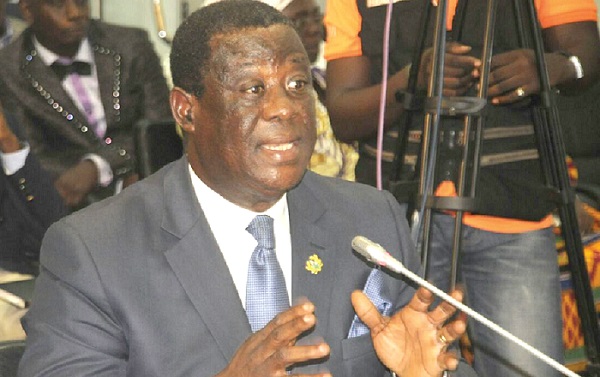
Ministry begins programme to reduce traffic
The Ministry of Roads and Highways has begun the implementation of the Accra Areawide Traffic Intelligent System to help reduce traffic congestion in the capital city.
The system relies on a coordinated traffic signal system with digitised traffic lights and a centralised control centre where all traffic signals will be monitored and controlled to improve traffic flow, trip reliability and road safety.
Advertisement
This means that all traffic lights across the city, including the newly deployed ones with artificial intelligence capabilities, will be managed from a Traffic Management Centre, where traffic on vital corridors and intersections in the city will be examined.
Inauguration
The Minister of Roads and Highways, Mr Kwesi Amoako-Atta, inaugurated two of the areawide traffic intelligent systems in Accra yesterday.
They are the Kanda Highway/Castle Road and the Starlet 91/Nationalism Park (close to the Accra Stadium) traffic lights.
Mr Amoako-Atta said the project was being implemented in two phases.
He said the first phase, which includes the operationalisation of 44 signalised intersections on the Amasaman/central business district of Accra corridor and the construction of the Traffic Management Centre, was completed in July 2019.
The second phase would include the completion of 253 signalised and non-signalised intersections within the city, he added.
He explained that the project had become necessary due to the rapid increase in vehicular traffic and lack of parking facilities in some parts of the capital.
Other benefits
Mr Amoako-Atta said when the project was fully completed, beyond easing traffic congestion, the number of policemen involved in the management of traffic within the Accra metropolis would significantly reduce to enable the Police Service to concentrate on its core duties of maintaining law and order and protecting citizens and properties.
“You may build interchanges to ensure the equitable distribution of vehicular traffic; you may improve road conditions, but one thing is key, and that is the traffic lights at the signalised intersections.
That is why all the time we have to employ the services of our policemen to direct traffic, which is not the best.
But when the traffic lights work well, you don’t need policemen to direct, traffic so when the project is completed, you won’t see the police directing traffic any longer,” he said.
He said the project would help remove the city’s regular gridlock during peak traffic hours and help lower air pollution.
“We are doing all these to ensure that traffic flows smoothly. There are a lot of advantages when traffic flows and many disadvantages when traffic is static,” he said.
The project, he said would be replicated in Kumasi, Takoradi and other major cities in the country.
Funding and scope
The project, which is being implemented through the Department of Urban Roads, is a component of the Accra Intelligent Traffic Management Project (AITMP) which was implemented under the Ghana-China Production Capacity Cooperation Project, with the support of the China Development Bank.
Parliament, in 2018, approved a $210-million facility to help synchronise traffic flow and traffic information systems in Accra, according to a Finance Committee report.
The scope of the project, according to the Ministry of Roads and Highways, includes the installation of an ICT-enhanced and solar-powered traffic signal control system, the development of a traffic flow guidance system, the installation of a traffic violation detection system and the installation of smart checkpoint system.
It also includes the installation of road signs, markings and pedestrian hand rails and the expansion of the Accra Traffic Management Centre.




